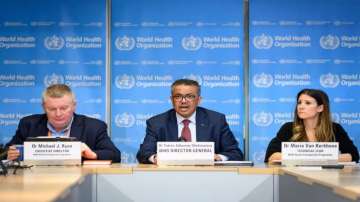The World Health Organisation (WHO) has acknowledged that 'evidence is emerging' of airborne spread of coronavirus after a group comprising of global scientists urged the world health watchdog to update its guidelines on how COVID-19 spreads among people.
Dr Maria Van Kerkove, technical lead on COVID-19 pandemic at WHO, said in a press briefing, "We have been talking about the possibility of airborne transmission and aerosol transmission as one of the modes of transmission of COVID-19."
The WHO also said that the spread of the virus was accelerating and that the death toll could spike in the future.
"In April and May, we were dealing with 100,000 cases a day," said Dr. Michael Ryan during a Tuesday press briefing. "Today we're dealing with 200,000 a day."
Ryan said that the number of deaths appeared to be stable for the moment, but he cautioned that there is often a lag time between when cases increase and when deaths are reported, due to the amount of time it takes for the coronavirus to run its course in patients.
Ryan said that the significant jump in cases was not due to more widespread testing.
Members of the WHO technical committee said that they are working on publishing a scientific brief about how and if the coronavirus can spread in the air.
''We've been working on this for several weeks now and we've engaged with a large number of (scientific) groups,'' Dr Maria Van Kerkhove, Head of the Technical Committee said.
It followed a letter published by more than 200 scientists who have called for the WHO and others to acknowledge that the coronavirus can spread in the air.
It would mean a change that could alter some of the current measures being taken to stop the pandemic.
Member of the technical committee Prof. Benedetta Allegrazzi said that evidence about the fact that coronavirus can spread in the air is emerging but ''it is not definitive.''
Latest World News
